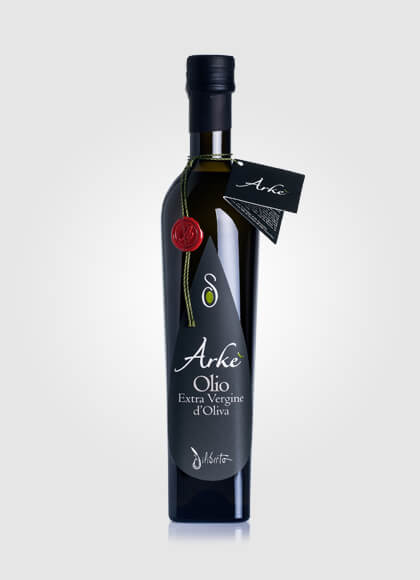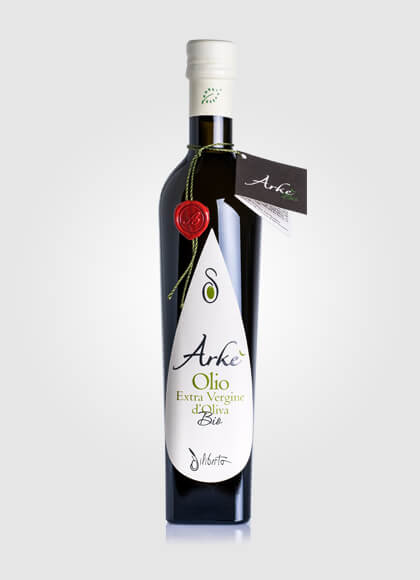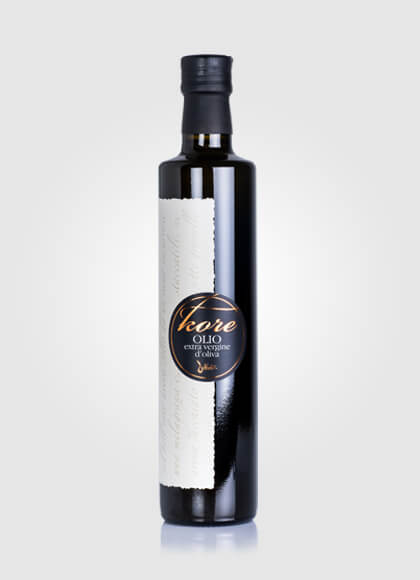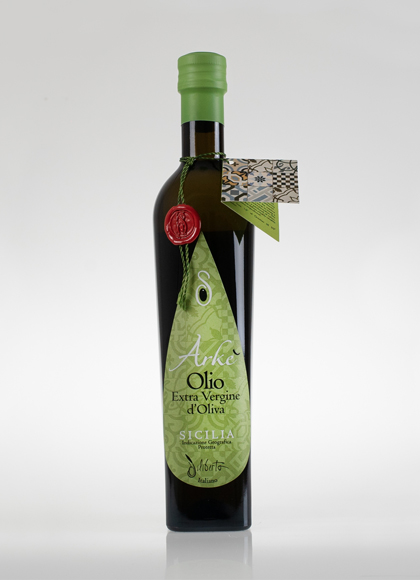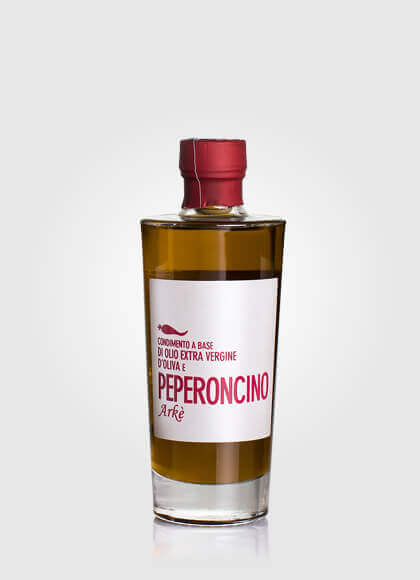Enter Email and Password provided during registration to the site.
Extra virgin olive oil is the most digestible dietary fat and it has no contraindication. In fact, it is recommended for children and for the elderly.
Contrary to the common belief, extra virgin olive oil doesn’t cause weight gain as it has 9 calories per gram like every other type of oil. On the contrary, the body stores extra virgin olive oil as fat deposits in smaller quantities. For its organoleptic and healthy properties it is preferable to seed oils or animal fats. It gives character and personality to dishes both raw and in frying. Its smoking point (210° C) is the highest among all types of oils and for this reason it is able to resist the high frying temperatures with a reduced production of free radicals and carcinogenic agents. Using extra virgin olive oil, frying will always be more digestible, healthier and tastier.
Palm and coconut oil, generally indicated on the printed label as "vegetable fats", are rich in saturated fatty acids which are not good for proper nutrition because they produce the same effect as those of animal origin and affect blood cholesterol. Seed oils are obtained, for the most part, by chemical extraction and are too rich in polyunsaturated fatty acids and more easily oxidizable. Therefore, the generic term "vegetable fats" does not ensure the nutritional quality of the product.
The extra virgin olive oil is more resistant to high temperatures than other vegetable fats, especially if it is high in phenolic compounds.
Cultivation practices, including the choice of the best harvest time, timing and methods of storage, extraction process technology and methods of preservation are factors determined by man who directly influences the organoleptic characteristics of extra virgin olive oil and therefore its quality.
The pungency is the sensory manifestation of the presence of an important class of aromatic substances called phenolic compounds that represent natural antioxidants and are responsible for this sensation. As the bitterness, the pungency is more intense in extra virgin olive oils made from green (unripe) olives and it is also determined by other factors, including the extraction technique choices.
The pungency and the bitterness in extra virgin olive oil represent two parameters of quality and they are indicators for an overall evaluation of high quality, due to the presence of healthy polyphenol content (antioxidants), tocepherol (vitamin E) and Oleuropein. These parameters are often considered defects because the pungency is associated with acidity. No one can determine the acidity of an extra virgin olive oil only by tasting it. It is necessary to make chemical analysis in a specific laboratory. Generally, stronger pungency and bitterness are related to very low acidity because they are proof of an extra virgin olive oil produced from healthy olives picked at the right level of maturity using the correct techniques for collecting, processing and preservation. The more harmonious the balance is among fruity, bitter and pungent attributes the higher the organoleptic value of the extra virgin olive oil will be.
The quality of an extra virgin olive oil is determined by a wide range of factors. Among the most important factors there are the type of olive (cultivar), ripeness at harvest, growing conditions (climate, soil type), crop maintenance (irrigation, pest control), handling of fruit from tree to mill, the milling process itself and the storage conditions. Having said that, for a high quality extra virgin olive oil the olives must be picked from the trees and never from the soil at the right level of ripeness; then they must be collected in well-ventilated containers and not in sacks and stored properly in dark and cool places. Olives have to be milled within 12 hours from the harvest taking care of the correct temperature and extraction process technique. Finally, special attention must be paid to workplace hygiene and to limit the contact with oxygen.
Extra virgin olive oils produced from an early harvest, when the olives are green, result more fruity, quite bitter and pungent. They are high in polyphenols (anti-oxidants) and thanks to these natural preservatives they have a long shelf life. As the fruit matures, the polyphenol and the chlorophyll contents decline. Therefore, oils produced from late harvest fruit tend to be less bitter, less pungent, and have a shorter shelf life.
An olive oil should preferably be consumed within 12 months because after a certain length of time it loses its main organoleptic positive attributes (colour, flavour, aroma, the intensity of pungency and bitterness). Nevertheless, an extra virgin olive oil can keep high quality characteristics for over one year and a half if it is high in polyphenols, if the olives were picked at the right level of ripeness, and if it is correctly preserved with proper storage conditions.
The turbidity of an extra virgin olive oil is a natural phenomenon that tends to decrease in the course of time. Even for extra virgin olive oils that have been properly racked, a very small amount of remaining sediment may be found in the bottom of the bottle. We suggest you to transfer the oil into a completely clean tank in order to remove the sediment.
The acidity cannot be determined by tasting, but only by chemical analysis in laboratory. The pungent taste is considered a positive attribute of an oil because it is related to the presence of beneficial antioxidants (polyphenols). The pungent intensity varies depending on the type of olives (cultivar), ripeness of the fruit at harvest, extraction technique and storage conditions. These components have an important role in preventing cellular ageing.
The elements that distinguish extra virgin olive oil are its fruitiness, a smell that recalls the olive, and the bitterness and pungency, which are absent in seed oils as they are tasteless and nearly odorless. Moreover, the virgin olive oils are obtained from the fruit of the olive tree picked solely by mechanical means. Seed oils instead are often obtained using solvents or chemicals processes.
Extra virgin is the highest grade of olive oil. It is obtained mechanically from the olives (it is pure fruit olive juice without further processing), and it has to match both chemical and organoleptic standards that include the absence of flavor defects. Olive oil is instead the result of a blend of refined olive oil (obtained by chemical treatments in order to remove chemical and organoleptic defects) and a small quantity of virgin olive oil. The European law does not establish the minimum quantity of virgin oil for this blend. Usually the percentage of virgin olive oil is the minimum necessary to restore color, smell and taste of the oil that in the end is a quite ‘flat’ oil.
The low level of acidity is one the most important factors in evaluating the quality of extra virgin olive oil. 0.8% of free fatty acid content (expressed as free oleic acid) is the limit established by law. The acidity is not perceived by tasting the olive oil as it can only be determined by chemical analysis.
The organoleptic or sensory characteristics of an olive oil are the basis to determine if a oil is extra virgin, virgin or lamp oil. For this reason, there is a scientific method of tasting for an organoleptic evaluation: the Panel test.
The aging of the fats is inevitable and it determines the more or less rapid appearance of the defect of rancid, influenced by oxygen (even air), light, storage temperature and the amount of antioxidants that may be contained. The rancidity will be delayed with higher levels of antioxidant content, typical of virgin olive oils.
In the 2-3 months following the milling, the extra virgin olive oil should be tranferred in another container 1-2 times in order to separate it from the deposits of particles of pulp, skins, vegetation water, which in case of fermentation may give the typical defects of vegetation water and sludge. During storage, the contact with air and light should be minimized and the storage environment should be kept at the constant temperature of 18° C.
Extra virgin olive can have various shades of colour, turning from a light gold to a rich green. Contrary to the common belief, the colour is not an indicator of the oil’s flavour or quality. The colour depends on several factors such as the olive variety, the fruit ripeness, the soil and climatic conditions and the prevalence of pigments like chlorophyll and carotenoids.
It is better to consume the extra virgin olive oil in the 12 months following the production, although it can be used up to about 20 months from the milling under the best conditions. The best way to prevent extra virgin olive oil from aging and to maintain the organoleptic and nutritional properties for as long as possible is to keep it at constant temperature of 18° C, in a tightly closed full container away from light and heat. Seal the bottle, store away from stoves and other heat sources in a dark and cool place. The best storage containers are the stainless steel containers or dark glass bottles that are able to protect the olive oil from auto-oxidation and photo-oxidation. In this way the polyphenols will slowly be oxidized and used up avoiding the extra virgin olive oil ageing quickly.
PSR Sicilia 2014/2020 - Sottomisura 4.2 - CUP G54H17000870007
Sostegno a investimenti a favore della trasformazione/commercializzazione
e/o dello sviluppo dei prodotti agricoli
PO FESR Sicilia 2014/2020 - Azione 3.4.2 - CUP G56J18000080004
Incentivi all'acquisto di servizi di supporto all'internazionalizzazione
Il progetto mira a consolidare la presenza sui mercati internazionali attraverso un'adeguata
comunicazione e la partecipazione ai maggiori eventi fieristici nei Paesi di riferimento.
Olio Arkè e Natura di Diliberto Salvatore E. M. & C. S.A.S.
C.da Grotta D'Acqua snc - 93100 Serradifalco (CL)
Informativa erogazioni pubbliche ex art.1, c.125-bis, L.124/2017
